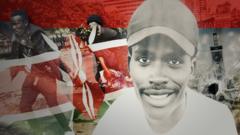The assassination of Kenyan lawmaker Charles Were in Nairobi marks a shocking act of violence against a political figure, raising questions about safety and government accountability.
Opposition Lawmaker Assassinated in Nairobi Shooting

Opposition Lawmaker Assassinated in Nairobi Shooting
Charles Were was shot dead while stopped at a traffic light, prompting calls for a thorough investigation.
In a shocking incident that has sent ripples through Kenyan politics, lawmaker Charles Were was assassinated on Wednesday evening while waiting at a traffic light in the heart of Nairobi. The police have classified the attack, carried out by a motorcycle-riding gunman, as “targeted and premeditated.”
Witnesses reported that the assailant, who hopped off the back of a motorcycle, opened fire into the passenger side of Mr. Were’s vehicle before escaping with his accomplice. The motive for this brutal attack remains unclear, with police spokesman Muchiri Nyaga noting that it's premature to speculate further.
Kenyan President William Ruto condemned the killing, urging for an extensive investigation and offering condolences to the family of the deceased lawmaker. “Those responsible must be held to account,” he asserted in a statement on Thursday.
Despite the violence, the driver and another passenger in Mr. Were's car were unharmed and quickly rushed him to Nairobi Hospital, where he was pronounced dead on arrival.
Re-elected in 2022 as part of the Orange Democratic Movement, an opposition party led by Raila Odinga, Mr. Were's assassination has drawn sharp criticism from his peers. Odinga characterized the incident as akin to “a gangland-style execution” and described the act as “shockingly barbaric.”
Historically viewed as a stable nation in a tumultuous region, Kenya has seen increasing frustration with its government, particularly following last year’s protests against tax hikes deemed necessary to address the country's significant national debt. Critics argue that President Ruto's promises of economic enhancement have not materialized, leading to a volatile political climate.
The assassination of Charles Were stands as a stark reminder of the risks faced by political figures in Kenya, underscoring the urgent need for accountability and reform within the system.



















